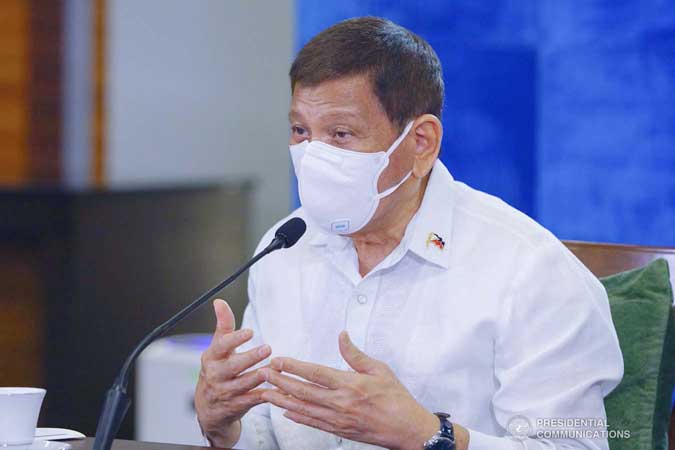Duterte says records on deadly drug war a national security issue

THE PHILIPPINES won’t give full access to records on its deadly war on drugs and anti-insurgency drive, President Rodrigo R. Duterte said on Monday night, citing national security concerns.
“We can’t open everything up not because we are hiding some facts,” he said at a televised address in mixed English and Filipino. “This is a national security issue.”
The President issued the statement after Interior and Local Government Secretary Eduardo M. Año said more than 20 people died in police anti-drug operations from May 26 to 30.
Mr. Duterte said deaths were avoidable in the government’s anti-illegal drug campaign.
“The drug suspects fight back,” he said.
The tough-talking leader said there were records that he was not privy to, adding that he is only briefed by his security officials when big personalities are involved.
“They only tell me who they are, but as to where they are and how they should be arrested, it’s none of my business really as President,” Mr. Duterte said of prominent Maoist rebels.
The President’s order is a “clear and undeniable pronouncement that this government openly encourages impunity — and that it is not intent on pursuing any form of justice for the victims of state violence and human rights abuses,” Karapatan Secretary General Cristina Palabay said in an e-mailed statement on Tuesday.
“What is clear and apparent is that these violations are brazenly conducted, at many times in full view of an audience, and while these violations continue, President Duterte is shielding the police by blocking access to records of police killings in the drug war,” she added.
The President in November said progressive party-list congressmen were communist fronts.
The Philippine National Police (PNP) on May 25 said it would let the Department of Justice (DoJ), which is leading a probe of drug-related deaths, access the records of 61 investigations against policemen in anti-drug operations.
A human rights group has said these make up less than 1% of more than 7,800 drug-related deaths.
The PNP later said it was willing to open the rest of the cases upon the DoJ’s request.
Fatou Bensouda, former chief prosecutor of the International Criminal Court, earlier said there was reasonable basis to believe that crimes against humanity had been committed under the administration’s drug war.
Her office said those crimes, including murder and torture, happened between July 1, 2016 and March 16, 2019.
Presidential spokesman Herminio L. Roque, Jr. said Mr. Duterte’s order only covered active cases under investigation. He also said some cases were not covered by “freedom of information.”
“The President has said he would back up the police when they do their job,” he said in Filipino. “If they violate the law, they’re on their own.”
Meanwhile, the DoJ and Department of Foreign Affairs (DFA) have completed talks with the United Nations (UN) about a joint program on technical cooperation on human rights.
“This joint program arose from the resolution of the UN Human Rights Council pertaining to the Philippines last year,” Justice Secretary Menardo I. Guevarra told reporters in a Viber group message.
Mr. Guevarra declined to give more details.
Meanwhile, the PNP said it would soon turn over 53 out of 7,884 cases of extrajudicial killings, including those involving policemen, after the cases are authenticated.
“I’ve communicated to the secretary of Justice last night, that these 53 cases are just being authenticated and they will be turned over to the DoJ for their further review,” national police chief Guillermo Lorenzo T. Eleazar told an online news briefing.
Mr. Guevarra said the DoJ might share the records with the Commission on Human Rights. — Kyle Aristophere T. Atienza and Bianca Angelica D. Añago



